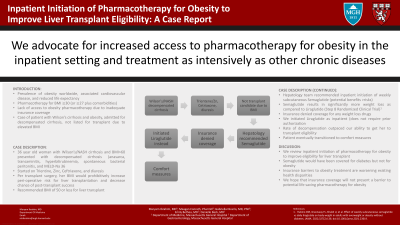Back


Poster Session B - Monday Morning
Category: Obesity
B0632 - Inpatient Initiation of Pharmacotherapy for Obesity to Improve Liver Transplant Eligibility: A Case Report
Monday, October 24, 2022
10:00 AM – 12:00 PM ET
Location: Crown Ballroom

Has Audio
.jpg)
Maryam Ibrahim, MD
Massachusetts General Hospital
Boston, MA
Presenting Author(s)
Maryam Ibrahim, MD1, Meagan Conrath, PharmD1, Gabriella Dicarlo, MD, PhD1, Emily Bethea, MD2, Danielle Back, MD1
1Massachusetts General Hospital, Boston, MA; 2Massachusetts General Hospital, Arlington, MA
Introduction: Obesity is one of the most prevalent chronic diseases worldwide, associated with cardiovascular disease and reduced life expectancy. Guidelines recommend pharmacotherapy for BMI 30 (or
30 (or  27 with comorbidities). Despite this, many patients cannot access pharmacotherapy for obesity due to inadequate insurance coverage. We present a case of a patient with Wilson’s cirrhosis and obesity, who was admitted for decompensated cirrhosis, but could not be listed for transplant due to elevated BMI. We discuss the challenge of inpatient initiation of pharmacotherapy for obesity.
27 with comorbidities). Despite this, many patients cannot access pharmacotherapy for obesity due to inadequate insurance coverage. We present a case of a patient with Wilson’s cirrhosis and obesity, who was admitted for decompensated cirrhosis, but could not be listed for transplant due to elevated BMI. We discuss the challenge of inpatient initiation of pharmacotherapy for obesity.
Case Description/Methods: 36 year old woman with Wilson’s/NASH cirrhosis and Class III Obesity (BMI > 60) presented with decompensated cirrhosis. She was admitted with anasarca, transaminitis, hyperbilirubinemia, spontaneous bacterial peritonitis (SBP), and a MELD-Na of 36. She was started on trientine and Zinc for her Wilson’s, antibiotics for SBP, and diuresis. She was evaluated by transplant surgery, who noted that her BMI and central adiposity would prohibitively increase peri-operative risk for liver transplantation and decrease chance of post-transplant success. They recommended BMI of 50 or less prior to consideration for liver transplant. The hepatology team then recommended inpatient initiation of weekly subcutaneous semaglutide to help achieve this BMI target. While there are not robust data on the use of GLP-1 agonists in decompensated cirrhosis, based on studies in NASH cirrhosis and on its pharmacokinetic profile, we felt that the potential risks of GLP-1 agonist therapy were outweighed by the benefit of improved eligibility for liver transplantation. Unfortunately her insurance denied coverage for any weight loss medication. However, we were able to initiate liraglutide as inpatient since it does not require prior authorization. To date, she has lost 32 lbs
Discussion: This case reviews the inpatient initiation of pharmacotherapy for obesity to improve eligibility for liver transplant. Unfortunately, there were insurance barriers to obesity treatment. While semaglutide would have been covered for diabetes treatment, it was not covered for obesity. Insurance coverage decisions may therefore worsen existing health disparities. We advocate for increased access to pharmacotherapy for obesity in the inpatient setting and believe that obesity should be treated as intensively as other chronic diseases. In the future, we hope that insurance coverage will not present a barrier to potential life-saving pharmacotherapy for obesity
Disclosures:
Maryam Ibrahim, MD1, Meagan Conrath, PharmD1, Gabriella Dicarlo, MD, PhD1, Emily Bethea, MD2, Danielle Back, MD1. B0632 - Inpatient Initiation of Pharmacotherapy for Obesity to Improve Liver Transplant Eligibility: A Case Report, ACG 2022 Annual Scientific Meeting Abstracts. Charlotte, NC: American College of Gastroenterology.
1Massachusetts General Hospital, Boston, MA; 2Massachusetts General Hospital, Arlington, MA
Introduction: Obesity is one of the most prevalent chronic diseases worldwide, associated with cardiovascular disease and reduced life expectancy. Guidelines recommend pharmacotherapy for BMI
Case Description/Methods: 36 year old woman with Wilson’s/NASH cirrhosis and Class III Obesity (BMI > 60) presented with decompensated cirrhosis. She was admitted with anasarca, transaminitis, hyperbilirubinemia, spontaneous bacterial peritonitis (SBP), and a MELD-Na of 36. She was started on trientine and Zinc for her Wilson’s, antibiotics for SBP, and diuresis. She was evaluated by transplant surgery, who noted that her BMI and central adiposity would prohibitively increase peri-operative risk for liver transplantation and decrease chance of post-transplant success. They recommended BMI of 50 or less prior to consideration for liver transplant. The hepatology team then recommended inpatient initiation of weekly subcutaneous semaglutide to help achieve this BMI target. While there are not robust data on the use of GLP-1 agonists in decompensated cirrhosis, based on studies in NASH cirrhosis and on its pharmacokinetic profile, we felt that the potential risks of GLP-1 agonist therapy were outweighed by the benefit of improved eligibility for liver transplantation. Unfortunately her insurance denied coverage for any weight loss medication. However, we were able to initiate liraglutide as inpatient since it does not require prior authorization. To date, she has lost 32 lbs
Discussion: This case reviews the inpatient initiation of pharmacotherapy for obesity to improve eligibility for liver transplant. Unfortunately, there were insurance barriers to obesity treatment. While semaglutide would have been covered for diabetes treatment, it was not covered for obesity. Insurance coverage decisions may therefore worsen existing health disparities. We advocate for increased access to pharmacotherapy for obesity in the inpatient setting and believe that obesity should be treated as intensively as other chronic diseases. In the future, we hope that insurance coverage will not present a barrier to potential life-saving pharmacotherapy for obesity
Disclosures:
Maryam Ibrahim indicated no relevant financial relationships.
Meagan Conrath indicated no relevant financial relationships.
Gabriella Dicarlo indicated no relevant financial relationships.
Emily Bethea indicated no relevant financial relationships.
Danielle Back indicated no relevant financial relationships.
Maryam Ibrahim, MD1, Meagan Conrath, PharmD1, Gabriella Dicarlo, MD, PhD1, Emily Bethea, MD2, Danielle Back, MD1. B0632 - Inpatient Initiation of Pharmacotherapy for Obesity to Improve Liver Transplant Eligibility: A Case Report, ACG 2022 Annual Scientific Meeting Abstracts. Charlotte, NC: American College of Gastroenterology.
